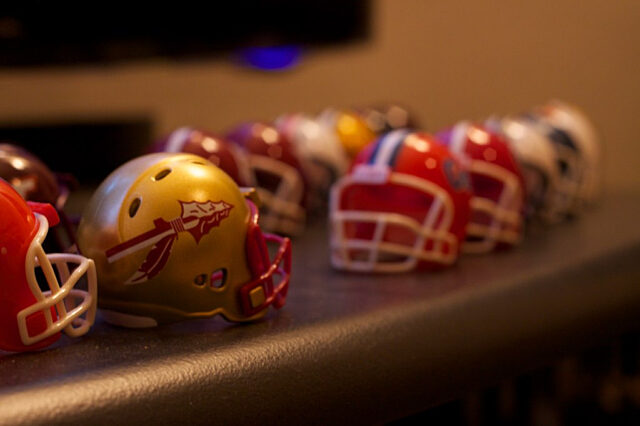Heads in the Game: 3 ways UF experts are treating and preventing concussions

The shattering crunch of two football players — two hundred pounds of flesh, muscle, plastic, metal and foam colliding with 10 times more G-force than an F-16 jet roll maneuver — tells you a lot about the importance of concussion research on America's favorite sport.
By definition, a concussion occurs when an individual's head collides with an object, leading to a change in brain function for a period of time. Concussions can happen through different means, such as a car accident or a fall, but in recent years, researchers at UF have focused intently on concussions found in athletes — especially football players, whose on-field hits can lead to undiagnosed concussions.
“You may see that a player has had many hits in a week, season or career,” said James Clugston, M.D., an assistant professor of community health and family medicine. “Some studies show that the risk of concussion goes up based on how many hits a player received in the preceding days, as well as how many concussions he may have had in the past.”
Here are some of the ways UF researchers and physicians are dedicating time and resources to concussion awareness while providing support for our community's athletes:
Helmet Sensors
Since October 2014, Clugston, also the University Athletic Association team physician, and his team have been using sensors, known as the Head Impact Telemetry System (HITS), in Gator players' helmets to measure impact, duration and location of hits in real time.
A football player's helmet is the first line of defense against concussions — so placing sensors that will help researchers gain valuable insight into the effect of on-field hits on players is a natural fit.
“We are still trying to find objective ways to detect concussions and help us know when someone is recovered so they can return to play,” Clugston said. “We wanted to get a measure of the amount of force that athletes were experiencing. With this system, we will get real-time data to assess the severity of the impact.”
UF Sports Concussion Center
Baseline testing is essential for diagnosing a concussion. The UF Sports Concussion Center, a division of UF's Student Health Care Center, provides baseline tests for the athletic program's 500-plus student-athletes prior to their first practice. Concussion researchers and experts work with the student-athletes and trainers in all sports, but especially football, women's soccer and women's lacrosse, which are the sports that produce the highest number of concussions.
Baseline screenings include cognitive and balance tests, as well as a vision measure known as the King-Devick Test — a two-minute challenge during which an athlete is asked to read single-digit numbers on cards or an electronic device. After a hit or suspected concussion, the athlete retakes the test. If he or she takes longer than their baseline, the athlete is removed from play for further evaluation. UF was one of the first schools to implement the King-Devick Test as part of the concussion-management program.
NCAA-DOD Study Participation
Concussions awareness is at an all-time high thanks to increased media attention, but this attention has outpaced the level of knowledge available about concussion treatment. In fact, a new movie called "Concussion," staring Will Smith, opens Christmas Day and will address concussion research on NFL players led by UF researcher and UF alumnus Steven DeKosky, M.D., interim executive director of the Evelyn F. and William L. McKnight Brain Institute of the University of Florida.
Clugston, who has dedicated more than 10 years of his career studying concussions at UF, also serves on the operating committee for a $30 million NCAA-Department of Defense research study, the largest and most comprehensive concussion and head impact exposure study to date.
UF is one of 11 schools and four service academies participating in the study, which will help eliminate the impact of concussions by managing and preventing them more effectively. The research study will not only help college-level athletes, but also youth sports participants, service men and women and individuals who have experienced traumatic head injury through an accident or fall.
Visit the UF Sports Concussion Center to learn more about UF's ongoing concussion research and our researcher's role in "Concussion".